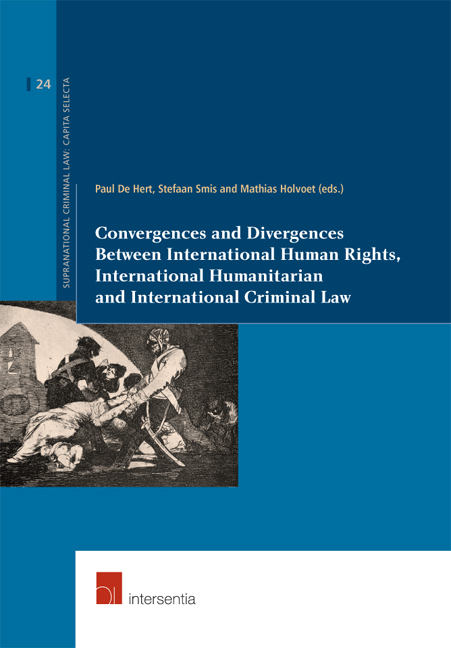Book contents
- Frontmatter
- Foreword
- Preface
- Contents
- About the Contributors
- Part I Convergences and Divergences between International Human Rights Law and International Criminal Law Stricto Sensu
- Part II Convergences and Divergences between International Human Rights Law and Transnational Criminal Law
- Part III Convergences and Divergences between International Human Rights Law and International Humanitarian Law
- ‘It was the Best of Times, it was the Worst of Times’: A Tale of Detention in Time of Emergency
- The European Court of Human Rights’ Approach to Armed Conflict and Humanitarian Law: Ivory Tower or Pas de Deux?
- Prohibitions on Arbitrary Displacement in International Humanitarian Law and Human Rights: A Time and a Place for Everything
- Investigations in Armed Conflict: Understanding the Interaction between International Humanitarian Law and Human Rights Law
- Conclusion
- Index
- About the Editors
Investigations in Armed Conflict: Understanding the Interaction between International Humanitarian Law and Human Rights Law
from Part III - Convergences and Divergences between International Human Rights Law and International Humanitarian Law
Published online by Cambridge University Press: 11 October 2018
- Frontmatter
- Foreword
- Preface
- Contents
- About the Contributors
- Part I Convergences and Divergences between International Human Rights Law and International Criminal Law Stricto Sensu
- Part II Convergences and Divergences between International Human Rights Law and Transnational Criminal Law
- Part III Convergences and Divergences between International Human Rights Law and International Humanitarian Law
- ‘It was the Best of Times, it was the Worst of Times’: A Tale of Detention in Time of Emergency
- The European Court of Human Rights’ Approach to Armed Conflict and Humanitarian Law: Ivory Tower or Pas de Deux?
- Prohibitions on Arbitrary Displacement in International Humanitarian Law and Human Rights: A Time and a Place for Everything
- Investigations in Armed Conflict: Understanding the Interaction between International Humanitarian Law and Human Rights Law
- Conclusion
- Index
- About the Editors
Summary
INTRODUCTION
The purpose of the present chapter is to examine the interaction between international humanitarian law (IHL) and human rights law (HRL) in relation to the duty to investigate in armed conflict. Scholars have extensively discussed many of the normative and practical implications arising from the interplay between these branches of international law. However, too little attention has been paid to how this interaction impacts the obligation to investigate. The analysis will look into how IHL and HRL respectively regulate this duty: it will be shown that whereas the latter prescribes in detail the standards an investigation must follow in order to be deemed effective, the former does not. Accordingly, the research question is whether and how HRL may complement IHL and fill what is here considered a gap in the law. To answer this question, the following three aspects will be examined.
The first concerns how human rights treaty bodies have applied the duty to investigate and the standards of effectiveness in armed conflict situations. It will be illustrated that an interpretive trend is emerging, according to which a State is required to take ‘all reasonable steps’ or ‘all feasible measures’ to investigate as effectively as possible under any circumstances. What this study terms the ‘all reasonable steps’ / ‘all feasible measures’ test will be pertinent to the application of the standards of effectiveness to war crimes investigations.
The second important aspect regards how HRL may complement IHL in relation to the standards of effectiveness and the right to an investigation. To explore this possibility, the study will examine the way in which IHL and HRL relate to each other at the macro level, namely as legal regimes, and at the micro level, when specific norms interact. It will employ a theoretical framework grounded on two elements: (1) a perspective of complementarity between IHL and HRL; and (2) the employment of the principle of systemic integration to connect their norms. This approach will enable to understand how norms from one body of law may be used to fill relevant gaps in the other.
The third aspect concerns the interplay of IHL and HRL norms regulating investigations. The analysis will specifically focus on two scenarios: concurrent applicability of the two legal frameworks, and exclusive applicability of IHL.
- Type
- Chapter
- Information
- Convergences and Divergences Between International Human Rights, International Humanitarian and International Criminal Law , pp. 259 - 286Publisher: IntersentiaPrint publication year: 2018



